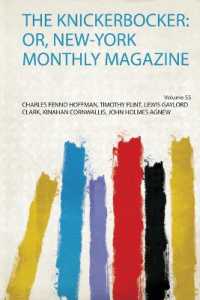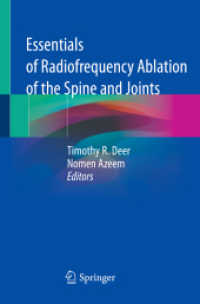Full Description
Hungarian composer Béla Bartók declared his Cantata profana, composed in 1930 and premièred in London in 1934, his "credo," the composition of which was inseparable from the history of his involvement with folklore. Not only was Bartók one of the twentieth century's most important composers, he was also one of the founders of comparative musicology, the precursor to the field of ethnomusicology. His collection and analytical studies of Hungarian, Romanian, and Slovak folk musics shaped his distinctive musical style, as well as complex scholarly publications. In this volume of the Studies in Musical Genesis, Structure, and Interpretation series, László Vikárius, a leading authority on Bartók, uncovers the many layers of ethnographic, historical, and personal meaning embedded in the Cantata profana.
The work's libretto was based on a Romanian folk ballad from his collection, and the mystical story of a hunter's nine sons who turn into stags--never to return home--was close to the composer's heart. Vikárius analyzes the origins of the piece, rooted in one of Bartók's most intensive periods of collecting activities in Transylvania just before the outbreak of World War I. The multi-ethnic folkloric landscape of "historic" Hungary (part of Austro-Hungary at the time) is embodied by the source materials for Cantata profana that survive in full to be analyzed, from the sketches to the various translations of the libretto. As Vikárius demonstrates, the choice of a Romanian winter solstice ceremonial text as libretto for Cantata profana combines Bartók's folklorism with a markedly neoclassical allusion to J. S. Bach's St Matthew Passion and is necessarily underpinned by the severe criticism Bartók faced because of his interest in and work on Romanian folklore. Throughout the book, Vikárius reveals numerous hidden details that prove crucial to the concept of the work and explores how its ideologically charged text underlines the aesthetic concept behind the musical decisions.
Contents
Series Editor Foreword
Abbreviations
Acknowledgements
Prologue: Between Sacred and Profane
Chapter 1: Bartók the Folklorist
Chapter 2: Romanian Christmas Songs
Chapter 3: The Composition of Cantata profana: Covert Genesis
Chapter 4: Documents of an Overt Genesis
Chapter 5: An Analysis of Cantata profana
Chapter 6: The Reception of Cantata profana
Epilogue: An ars poetica
Appendices
Select Bibliography
Index








